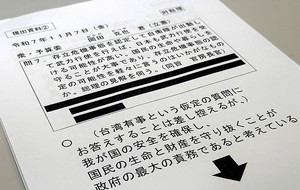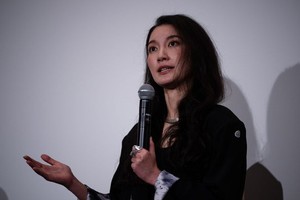Vox Populi, Vox Dei is a daily column that runs on Page 1 of The Asahi Shimbun.
March 2, 2023 at 15:23 JST
 Journalist Takichi Nishiyama, left, speaks in Tokyo on July 14, 2014, about the Supreme Court ruling rejecting the disclosure of secret documents related to the return of Okinawa to Japan. (Asahi Shimbun file photo)
Journalist Takichi Nishiyama, left, speaks in Tokyo on July 14, 2014, about the Supreme Court ruling rejecting the disclosure of secret documents related to the return of Okinawa to Japan. (Asahi Shimbun file photo)
An excerpt from a Foreign Ministry telegram in May 1971 hinted that a secret agreement had been reached between Japan and the United States over the terms of the reversion of Okinawa to Japanese rule.
The pact had been agreed upon during a meeting of the Japanese foreign minister and the U.S. ambassador to Japan.
The excerpt in question, in Japanese, read as follows: “Mondai wa jisshitsu dewanaku appearance dearu” (literally, “The problem is not the substance but the appearance”).
What this implied was that the United States would pretend to pay Japan the cost of restoring the land that U.S. bases occupied to their original condition while Japan would quietly cover the entire cost--all of $4 million, or about 1.2 billion yen at the time.
Takichi Nishiyama, a Mainichi Shimbun reporter who obtained that secret document, died on Feb. 24. He was 91.
Nishiyama resigned from Mainichi after he was arrested on charges of violating the National Civil Service Law. The media initially defended his action, justifying it as “uncovering a secret pact” and “pursuing the public’s right to know.”
But when the prosecutors revealed in their indictment that he was “intimate” with the female Foreign Ministry official who gave him the classified document, the case turned into a sex scandal overnight, and the media also switched into outright personal attack mode.
The Supreme Court confirmed Nishiyama’s guilt. After the United States disclosed official documents corroborating the secret pact, Nishiyama initiated a lawsuit demanding the Japanese government also come clean.
A senior Foreign Ministry official at the time acknowledged the existence of the secret agreement. However, the Japanese government has yet to do so.
In “Nishiyama Takichi Saigo no Kokuhaku” (The last confession of Takichi Nishiyama), which he published last year, he recalled his life after revealing the state secret was “a battle against governmental authority itself.”
He also pointed out similarities between his case and the Moritomo Gakuen scandal, noting that, “Coverups and falsifying information continue to this day.”
Having been a “patriotic boy” during World War II, Nishiyama said he became a newspaper reporter because he acutely felt after the war that power must be monitored and kept in check.
I am going over and taking to heart his parting words of advice: “Never hesitate to report state secrets” and “Do not be fooled by appearances.”
--The Asahi Shimbun, Feb. 27
* * *
Vox Populi, Vox Dei is a popular daily column that takes up a wide range of topics, including culture, arts and social trends and developments. Written by veteran Asahi Shimbun writers, the column provides useful perspectives on and insights into contemporary Japan and its culture.




















A peek through the music industry’s curtain at the producers who harnessed social media to help their idols go global.
A series based on diplomatic documents declassified by Japan’s Foreign Ministry
Here is a collection of first-hand accounts by “hibakusha” atomic bomb survivors.
Cooking experts, chefs and others involved in the field of food introduce their special recipes intertwined with their paths in life.
A series about Japanese-Americans and their memories of World War II